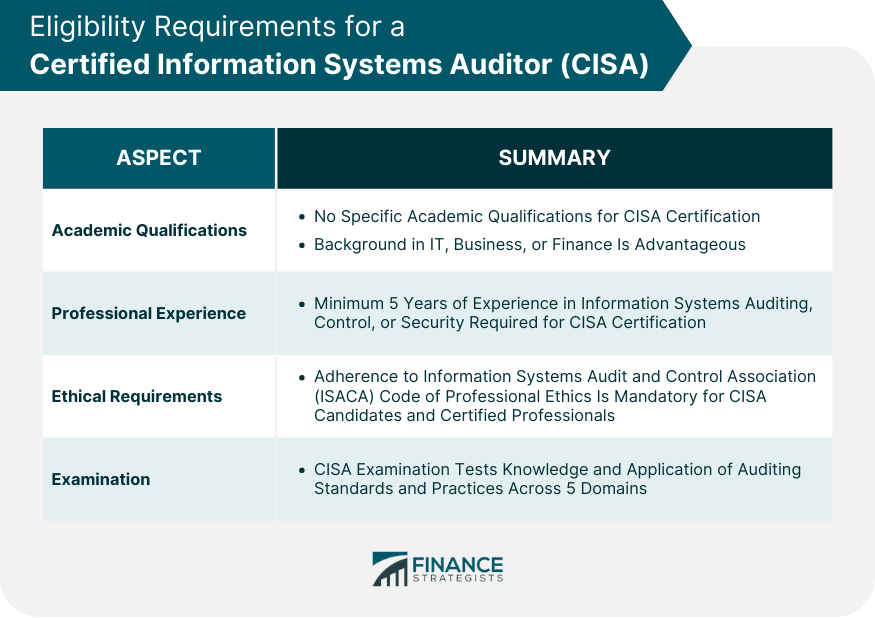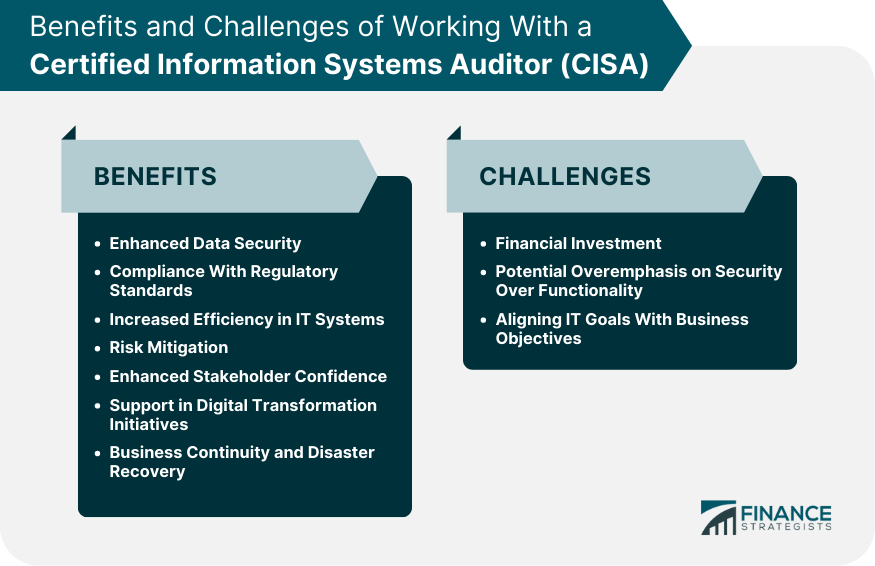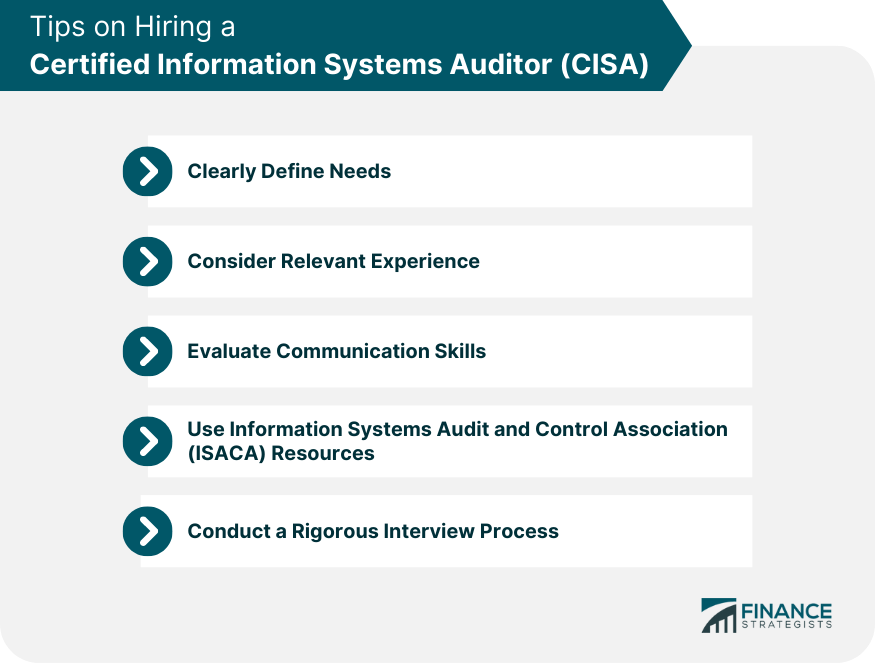A CISA is a globally recognized professional certification for Information System Audit control, assurance, and security professionals. The certification is provided by Information Systems Audit and Control Association (ISACA), a nonprofit professional association for IT governance, risk management, and cybersecurity professionals. Individuals with CISA certification are recognized for their expertise in auditing, controlling, and assuring enterprise IT and business systems. With the rapid digital transformation of businesses, securing information systems and ensuring their alignment with business objectives has become a pressing concern. CISAs are uniquely equipped to address these challenges. They bring a comprehensive understanding of IT systems, regulatory requirements, and risk management practices. They help organizations ensure that their IT systems are robust, secure, and efficient, facilitating enhanced business performance. The CISA certification does not require specific academic qualifications. However, a background in IT, business, or finance can be advantageous in understanding and applying the principles of information systems auditing. To obtain the CISA certification, candidates must have a minimum of five years of work experience in information systems auditing, control, or security. This experience must be within the 10 years preceding the application for certification or within five years of passing the examination. CISA candidates and certified professionals must adhere to the ISACA Code of Professional Ethics. This code outlines the ethical responsibilities of professionals in upholding integrity, confidentiality, and professionalism in their work. Finally, candidates must pass the CISA examination, which tests knowledge and application of information systems auditing standards and practices. The exam is divided into five domains: the process of auditing information systems; governance and management of IT; information systems acquisition, development, and implementation; information systems operations and business resilience; and protection of information assets. Financial organizations deal with highly sensitive data that, if compromised, can lead to severe financial and reputational damage. CISAs, equipped with their expert knowledge, can identify potential vulnerabilities and implement robust security measures to protect critical financial data and systems. CISAs are knowledgeable about various regulatory standards, including the Health Insurance Portability and Accountability Act (HIPAA), General Data Protection Regulation (GDPR), and Sarbanes-Oxley Act (SOX). They can help an organization ensure that its information systems are compliant with these regulations, thereby minimizing the risk of non-compliance penalties. CISAs can identify inefficiencies in existing systems, recommend and implement improvements, and monitor these systems to ensure they continue to function optimally. Efficient IT systems mean smoother, faster processing of financial transactions and data, resulting in cost savings and improved productivity. CISAs conduct comprehensive risk assessments to identify potential threats to an organization's IT systems and financial data. They then devise strategies to mitigate these risks, ensuring the organization is well-prepared for potential cyber threats. The presence of a CISA within an organization signals a commitment to data security and best practices in IT governance. This can foster increased confidence among stakeholders, including investors, customers, and regulatory bodies. Many financial organizations are undergoing digital transformation to improve their services and stay competitive. A CISA can provide valuable support in such initiatives. They can guide the process to ensure new systems are secure, efficient, and aligned with the organization's business objectives. In an era where data is one of the most valuable assets, ensuring business continuity and robust disaster recovery is crucial. This importance is heightened in the finance sector, where data loss or system downtime can have significant financial implications. A CISA can help develop and implement business continuity and disaster recovery plans, providing an added layer of security for the organization's operations. CISAs command high salaries commensurate with their expertise and the value they bring to an organization. For small businesses or startups operating with tight budgets, this might be a deterrent. While this usually aligns with the broader goal of protecting the organization, there may be instances where it could lead to friction, especially if the security measures impede the workflow or hinder the user experience. While a CISA can provide technical guidance, they might not be fully versed in the unique operational aspects or strategic goals of the organization. As such, effective communication and cooperation between the CISA and organizational leadership is essential. In many organizations, the CISA works closely with the CFO. This collaboration ensures that the organization's IT systems align with its financial goals and strategies. The CISA can also assist the CFO in understanding the financial implications of various IT risks and the strategies needed to mitigate them. The CISA also interacts with financial analysts, particularly in matters related to financial data integrity. The CISA can provide invaluable assistance in ensuring the accuracy and security of the data that financial analysts use for their analyses. Financial auditors and CISAs often work hand in hand. The CISA's expertise in IT systems can be invaluable in financial audits, especially in evaluating the IT controls related to financial data. By providing assurance about these controls, the CISA aids financial auditors in their overall audit process. Do you need someone to focus primarily on risk assessment? Or perhaps you need someone to help with regulatory compliance or to improve the efficiency of your IT systems? Understanding your specific needs will help you evaluate potential candidates more effectively. While the CISA certification itself is valuable, it's also important to consider a candidate's relevant experience. If your organization works with particular technologies or you operate in a specific industry sector, look for candidates with experience in these areas. In a financial context, consider candidates with a solid understanding of finance and experience in financial auditing or related roles. As a CISA will often have to communicate technical information to non-technical stakeholders, strong communication skills are crucial. During the hiring process, assess a candidate's ability to explain complex IT concepts clearly and succinctly. Consider using the resources provided by ISACA, the organization that awards the CISA certification. They maintain a database of certified professionals, which can be a valuable tool for finding candidates and verifying their certification status. During interviews, ask candidates to discuss previous work they've done that's similar to what they would be doing in your organization. Consider including scenario-based questions that allow candidates to demonstrate their problem-solving skills and how they apply their knowledge in real-world situations. Certified Information Systems Auditors play a vital role in today's digital landscape, particularly in the finance sector. Their expertise in auditing, controlling, and assuring IT and business systems brings enhanced data security, regulatory compliance, increased efficiency, risk mitigation, stakeholder confidence, and support for digital transformation initiatives. Despite challenges such as financial investment and potential friction between security and functionality, the benefits of hiring a CISA far outweigh these concerns. CISAs help organizations protect critical financial data, ensure compliance with industry regulations, optimize IT systems for improved productivity, identify and mitigate risks, foster stakeholder trust, and support strategic digital initiatives. Organizations can find a qualified CISA who will have a significant impact on their information systems and overall business operations by carefully considering specific organizational needs, evaluating relevant experience, and assessing communication skills during the hiring process.What Is a Certified Information Systems Auditor (CISA)?
Eligibility Requirements for CISA
Academic Qualifications
Professional Experience
Ethical Requirements
Examination

Benefits of Working With a CISA
Enhanced Data Security
Compliance With Regulatory Standards
Increased Efficiency in IT Systems
Risk Mitigation
Enhanced Stakeholder Confidence
Support in Digital Transformation Initiatives
Business Continuity and Disaster Recovery
Challenges of Working With a CISA
Financial Investment
Potential Overemphasis on Security Over Functionality
Aligning IT Goals With Business Objectives

CISA and Finance Professionals
Chief Financial Officer (CFO)
Financial Analysts
Financial Auditors
Tips on Hiring a CISA
Clearly Define Your Needs
Consider Relevant Experience
Evaluate Communication Skills
Use ISACA Resources
Conduct a Rigorous Interview Process

Final Thoughts
Certified Information Systems Auditor (CISA) FAQs
A CISA is responsible for auditing, controlling, and assuring enterprise IT and business systems. They ensure that information systems are secure, compliant with regulations, and aligned with business objectives.
To become a CISA, candidates need a minimum of five years of work experience in information systems auditing, control, or security. They must also pass the CISA examination, which tests their knowledge of information systems auditing standards and practices.
CISAs possess expert knowledge in identifying vulnerabilities and implementing robust security measures. They help protect critical financial data and systems, ensuring that sensitive information remains secure from potential breaches.
CISAs are well-versed in regulatory standards such as HIPAA, GDPR, and SOX. They assist organizations in ensuring that their information systems are compliant with these regulations, minimizing the risk of non-compliance penalties.
Some challenges of working with a CISA include the financial investment required to hire their expertise, the potential for an overemphasis on security that may hinder functionality, and the need for effective communication and alignment of IT goals with the organization's broader business objectives.
True Tamplin is a published author, public speaker, CEO of UpDigital, and founder of Finance Strategists.
True is a Certified Educator in Personal Finance (CEPF®), author of The Handy Financial Ratios Guide, a member of the Society for Advancing Business Editing and Writing, contributes to his financial education site, Finance Strategists, and has spoken to various financial communities such as the CFA Institute, as well as university students like his Alma mater, Biola University, where he received a bachelor of science in business and data analytics.
To learn more about True, visit his personal website or view his author profiles on Amazon, Nasdaq and Forbes.















